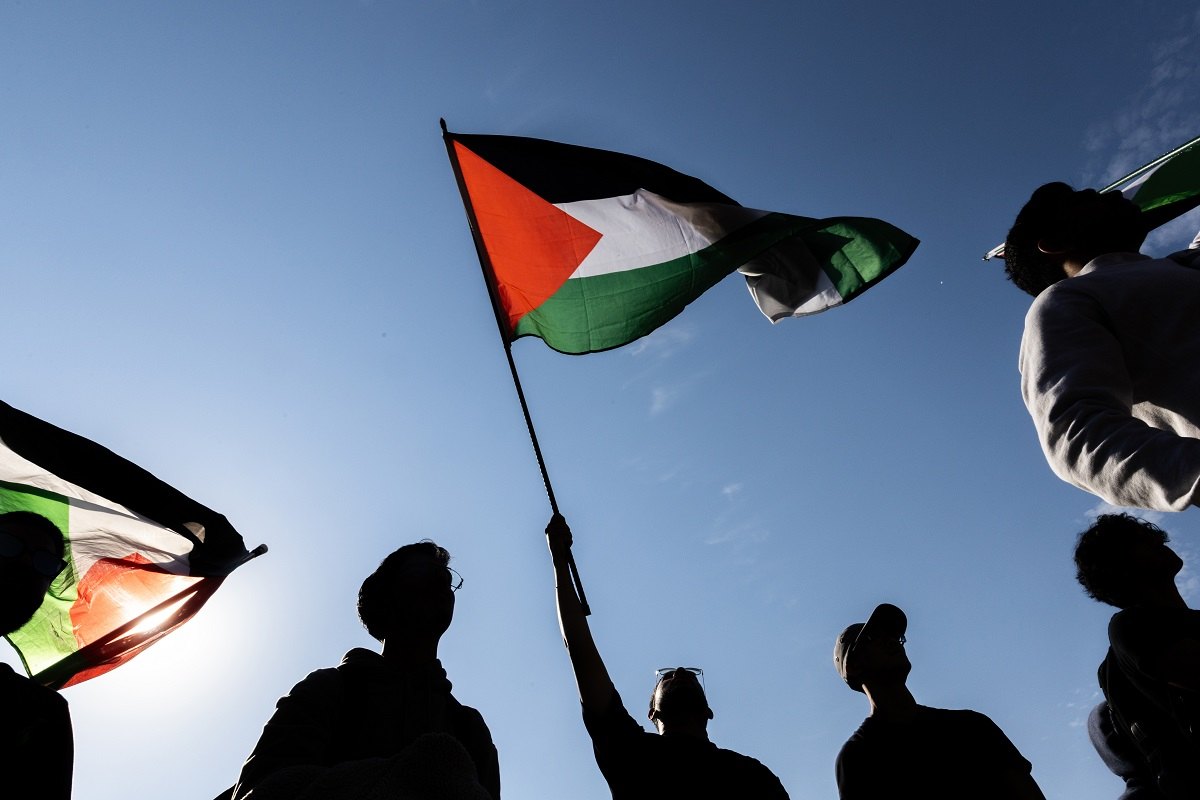
Hundreds of University of Maryland students gather on Hornbake Plaza for a pro-Palestinian protest on Nov. 9.
17:43 JST, September 18, 2024
A pro-Palestinian student group has accused the University of Maryland in College Park of violating students’ First Amendment rights by canceling a vigil planned for Oct. 7 to mourn the people who have died in the Gaza Strip over the past year.
The date of the vigil marks one year since Hamas militants attacked Israel, killing about 1,200 people and taking about 250 hostage, according to Israeli authorities. In response, Israel launched a war that has led to a year of nearly continuously fighting and killed more than 40,000 people in Gaza, according to the Gaza Health Ministry.
The Council on American-Islamic Relations filed the lawsuit Tuesday in the U.S. District Court in Maryland on behalf of the U-Md. chapter of Students for Justice in Palestine (SJP), which alleges the university canceled the event after complaints from Jewish groups that a possible demonstration would be painful for mourning students. This decision, the suit argues, amounts to censorship.
“The University of Maryland cannot ignore the Constitution to censor Palestinian and Jewish students, simply because anti-Palestinian groups complain,” Palestine Legal staff attorney Tori Porell said in a news release. “It is the job of universities to seek out, not censor, robust debate on pressing social issues.”
The conflict unfolding at the University of Maryland reflects how outrage and grief over the Israel-Gaza war has continued to spill into academic life, spurring backlash against university administrators who are tasked with balancing concerns from students across the ideological spectrum alongside safe expressions of speech.
The Diamondback, the independent student newspaper at U-Md., reported that students have held sit-ins and walkouts calling for a cease-fire in the war and advocating for Palestinians in Gaza. Pro-Palestinian students have also protested the annual Israel Fest event.
Asked to comment on the lawsuit, U-Md. spokeswoman Katie Lawson pointed to University President Darryll J. Pines’s Sept. 1 message to the campus when he announced that “only university-sponsored events that promote reflection” would be permitted Oct. 7.
Pines acknowledged that “numerous calls have been made to cancel and restrict the events that take place” on Oct. 7, spurring him to request a safety assessment from the university police.
Ultimately, he wrote, the decision to restrict events was made “out of an abundance of caution” and alongside the University System of Maryland, which encompasses the state flagship campus in College Park and 11 other public institutions.
University System of Maryland spokesman Mike Lurie said the system does not comment on pending litigation.
According to the lawsuit, the U-Md. chapter of SJP planned to co-host the vigil with Jewish Voice for Peace at the university’s McKeldin Mall.
The group planned several activities such as “teach-ins about Palestinian history, culture and solidarity between Palestinians and other marginalized groups; tables highlighting Palestinian art and traditional crafts; a visual display of kites, a motif in Palestinian poetry; as well as a vigil and inter-faith prayers,” the suit says. Several students who lost family in Gaza were invited to speak.
“The First Amendment does not allow campus officials to establish free expression-black-out days, even on occasions that may be emotional or politically polarizing,” the suit says.
But the date of the event – which corresponds to the deadliest attack on Jews since the Holocaust – concerned many in the campus Jewish community. The university’s Jewish Student Union said in a Sept. 1 statement that it was “relieved” that the SJP event was canceled.
Oct. 7 “is a day of mourning for the Jewish and Israeli community,” the Jewish Student Union wrote.
In response to a request for comment on the lawsuit, Rabbi Ari Israel, executive director of the University of Maryland Hillel, expressed his gratitude for “Pines’ and his administration’s supportive leadership.”
“Under the circumstances, we believe the University emphasized being thoughtful about student safety and are appreciative of the University’s decision regarding student gatherings on October 7th,” he said in a statement.
University of Maryland student Daniela Colombi, a member of the SJP chapter, wore a kaffiyeh as she spoke at a news conference Tuesday. She described the group’s values as “equality, justice and liberation, not just for Palestine, but for all.” She called on the university and the statewide system to reverse their decisions and allow the vigil.
In the suit, the SJP chapter requests that the court find the restrictions on Oct. 7 events unconstitutional and award damages for violating the group’s First Amendment rights, plus attorneys’ fees.
Colombi, a third-year student studying physics and astronomy, said she viewed Oct. 7 as an opportunity to educate the campus community about the tens of thousands of people who have died in Gaza.
“We sought to use this reservation to awaken in our community the understanding that these people are not merely numbers, and they never were,” she said. “They had dreams, loves and futures.”
Top Articles in News Services
-

Survey Shows False Election Info Perceived as True
-

Prudential Life Expected to Face Inspection over Fraud
-

Hong Kong Ex-Publisher Jimmy Lai’s Sentence Raises International Outcry as China Defends It
-

Japan’s Nikkei Stock Average Touches 58,000 as Yen, Jgbs Rally on Election Fallout (UPDATE 1)
-

Japan’s Nikkei Stock Average Falls as US-Iran Tensions Unsettle Investors (UPDATE 1)
JN ACCESS RANKING
-

Japan PM Takaichi’s Cabinet Resigns en Masse
-

Japan Institute to Use Domestic Commercial Optical Lattice Clock to Set Japan Standard Time
-

Israeli Ambassador to Japan Speaks about Japan’s Role in the Reconstruction of Gaza
-

Man Infected with Measles Reportedly Dined at Restaurant in Tokyo Station
-

Videos Plagiarized, Reposted with False Subtitles Claiming ‘Ryukyu Belongs to China’; Anti-China False Information Also Posted in Japan
























